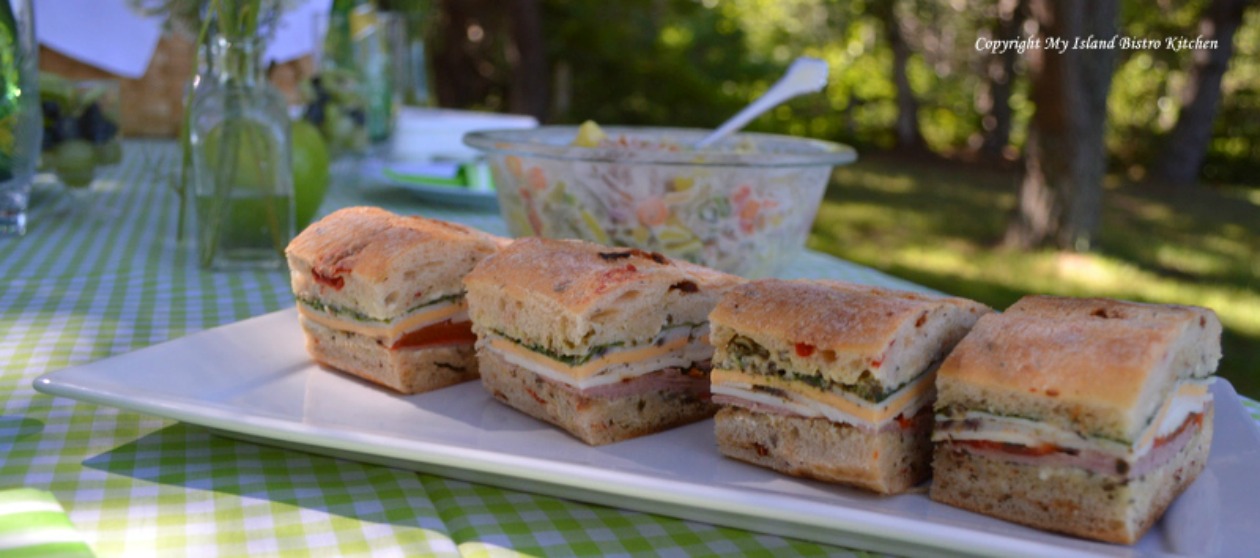
Some may know this old-fashioned bread simply as “Porridge Bread” because of its rolled oat content. Rustic Oatmeal Bread is a hearty bread that has a soft, chewy texture. It’s ideal as a sandwich bread, makes fabulous toast, is great for French toast and, heck, it’s just fine slathered with butter or molasses!
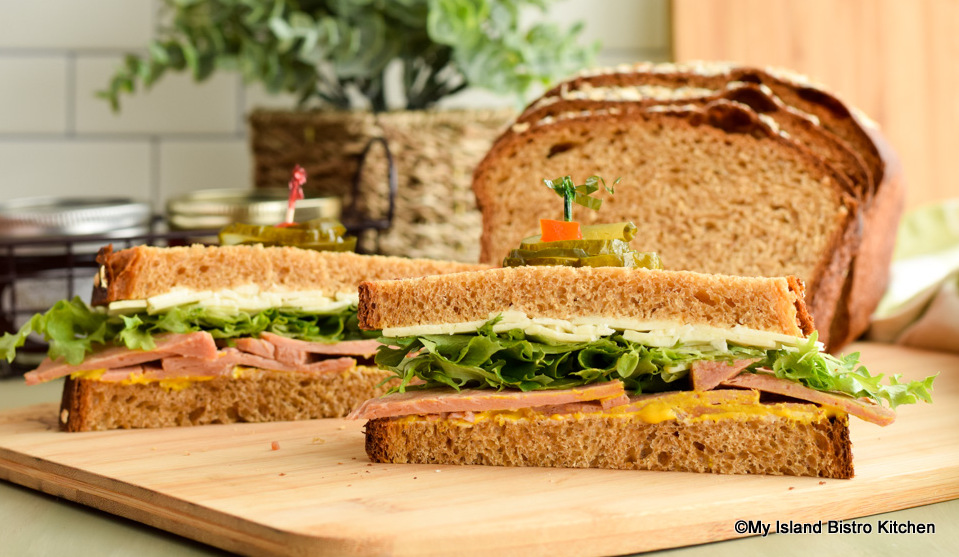
In other postings with bread recipes, I have written extensively about the breadmaking method, the importance of protein in flour used for yeast breads, and the difference between all-purpose and bread flours. Therefore, I won’t repeat the information here but will instead direct readers (especially those not experienced with bread making) to those postings, the links for which can be found below.
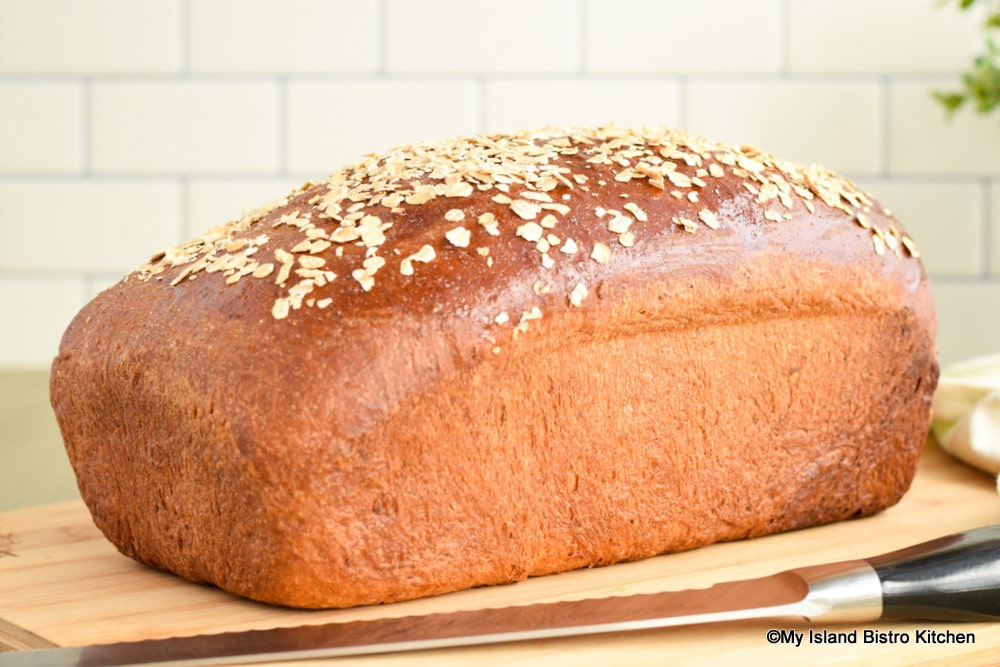
My recipe includes an optional “topping” for Rustic Oatmeal Bread that involves applying an egg white wash and sprinkling rolled oats over the tops of the loaves. I have made this bread using this topping but I often make it, leaving the loaf tops plain then simply brushing the tops of the hot loaves with butter as soon as the bread comes out of the oven. The rolled oat topping is purely aesthetic (but don’t you think it looks great in photos!). However, I find that not all of the oats stick to the egg wash and, when turning the loaves out of the pans, a lot of the rolled oats simply fall off. So, the topping is purely personal preference.
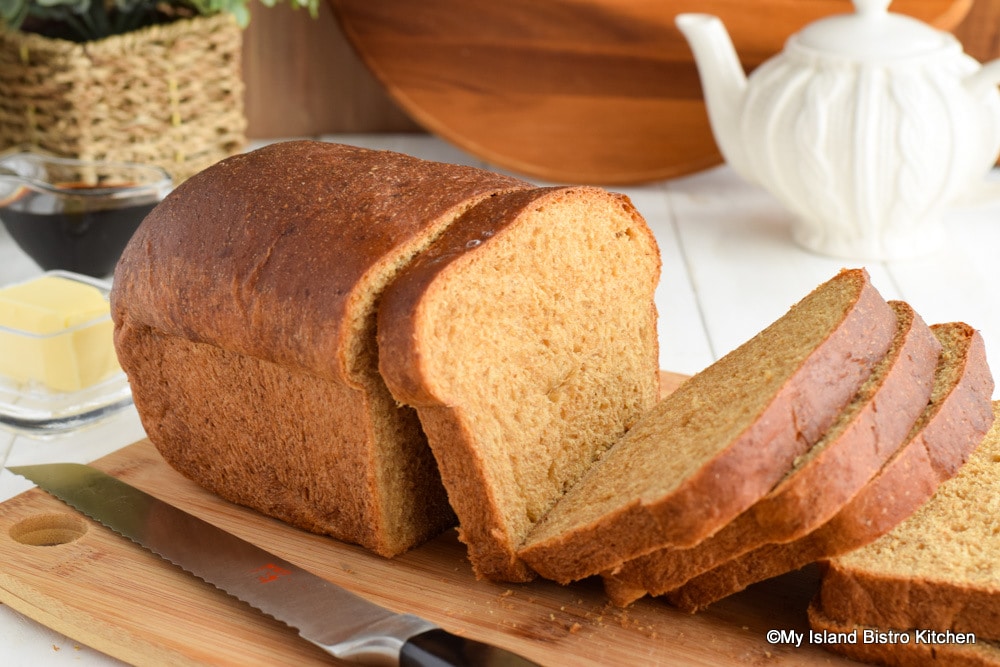
As always, I recommend two things: 1) Read and re-read the recipe before beginning to make the bread to ensure understanding of the method; and 2) Set out and measure all ingredients before beginning the process of making bread.
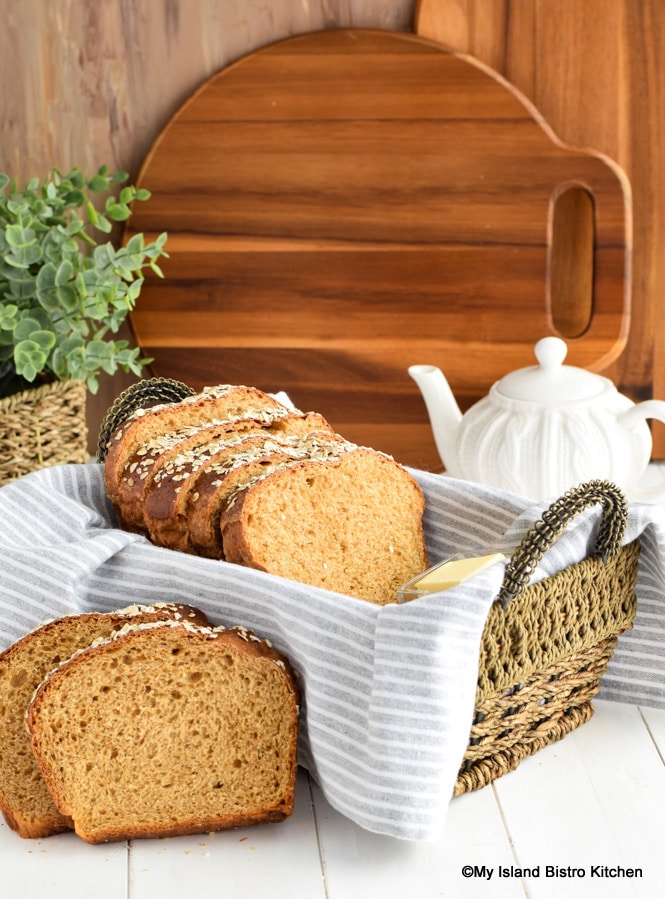
[Printable recipe follows at end of post]
Rustic Oatmeal Bread
Ingredients:
1 cup quick cooking rolled oats (not instant oats)
3 tablespoons butter, room temperature
1/3 cup molasses
3 tbsp brown sugar, packed
2/3 cup scalded milk (no less than 2%M.F.)
1 1/3 cups boiling water
1 large egg yolk, room temperature, lightly broken up with fork (reserve egg white for loaf topping, if desired)
1½ cups whole wheat bread flour
4 cups white bread flour (*see note below)
2 tsp salt
½ cup warm water (110°F)
1 tsp granulated sugar
1 tbsp + 1 tsp traditional active dry yeast
Rolled Oat Topping: (optional)
1 egg white + 1 tbsp water
Apx. ¼ cup quick cooking rolled oats
Cooking oil
Method:
Assemble and measure out all ingredients.
Place rolled oats, butter, molasses, and brown sugar in medium-sized heat-proof bowl.
In separate bowl, combine the 1½ cups whole wheat bread flour with 3 of the cups of the white bread flour along with the salt. Whisk together well and set aside.
In small-sized saucepan, over medium-high heat, bring milk to the scalding point (180°F), stirring frequently to prevent milk from scorching. Do not boil the milk.
Boil 1 1/3 cups water. Pour the scalded milk and boiling water over the rolled oats mixture. Stir and let stand until mixture has cooled to lukewarm then whisk in the lightly broken up egg yolk.
While the rolled oat mixture is cooling, place ½ cup warm water (110°F) in two-cup measuring cup or bowl. Stir 1 tsp sugar into the warm water until sugar is dissolved. Sprinkle yeast over the water and quickly, but gently, stir in the yeast. Let yeast stand, undisturbed with no stirring, for about 10-12 minutes, or until yeast is foamy and bubbly. Stir down yeast and stir into lukewarm rolled oat mixture.
In bowl of stand mixer fitted with dough hook, combine the rolled oat and yeast mixture along with 2 cups of the whole wheat, white flour, and salt mixture gradually added, one cup at a time. Beat on slow speed to blend ingredients then increase speed to medium (e.g., the “6” setting on KitchenAid Classic mixer) and beat for 1 minute. Scrape the bowl to ensure all ingredients are incorporated. Again, with mixer on slow speed, gradually add 1 more cup of the flour mixture. Increase speed to medium and beat mixture for 1 minute. Scrape down sides of bowl and repeat procedure for adding the remaining 1½ cups of the whole wheat/white flour mixture, beating for 1 minute to blend in dry ingredients. Mixture will be very sticky at this point.
Transfer mixture to a floured surface, using some of the remaining cup of white bread flour to flour the work surface. With hands greased with a small amount of vegetable oil, begin kneading the dough by hand, continuing to add more of the flour called for in the recipe until the dough is smooth, elastic, and pliable, about 7-10 minutes. Periodically re-grease hands with the oil as necessary to prevent them from sticking to the dough. (Note: If you have a very large mixer, the dough could be completely kneaded by mixer; however, if you have a standard-sized stand mixer, it will be difficult to get the dough perfectly kneaded by mixer with the quantity of flour called for in this recipe).
Grease a bowl large enough to allow the dough to double in size. Grease all sides of dough with vegetable oil to prevent it from drying out and transfer dough to prepared bowl. Cover the top of the bowl loosely with plastic wrap that has been sprayed with cooking oil. Cover bowl completely with a towel or lightweight blanket and place in warm, draft-free location to rise until dough doubles in size, about 1¼ – 1¾ hours.
Prepare two 9”x5”x3” loaf pans by greasing pans (including rims) well.
Using vegetable oil, grease the work surface. Deflate the dough by making a fist and punching down the dough in the bowl. Turn flattened dough out onto greased surface. Divide dough into two equal portions.
Shape each portion of dough into an oval loaf shape and place in prepared pans.
Cover loaves loosely with a tea towel and place in warm, draft-free location to rise again for about an hour or until doubled in size.
About 20 minutes before bread is expected to be ready to be baked, preheat oven to 350°F.
If rolled oat topping of loaves is desired, beat egg white and 1 tablespoon water with fork or small whisk in small bowl. With a silicone pastry brush and a light touch, brush egg wash over tops of each loaf and sprinkle 1½ – 2 tablespoons of rolled oats over each loaf.
Transfer loaves to oven and bake for approximately 45-50 minutes, or until bread is nicely browned on top and loaves sound hollow when tapped. Immediately transfer bread from pans to wire racks to cool. As an alternative to the rolled oat topping, leave loaf tops plain then gently brush tops of the hot bread with butter as soon as the loaves come out of the oven. Cool bread completely before cutting and serving.
Yield: 2 loaves
Note: Bread flour is recommended for this recipe; however, all-purpose flour may be substituted (cup-for-cup) for the white bread flour content. Results may differ with substituted all-purpose flour product.
Connect with My Island Bistro Kitchen on Social Media
Join the Facebook page for My Island Bistro Kitchen: https://www.facebook.com/MyIslandBistroKitchen/
Follow “the Bistro” on “X” (formerly Twitter): https://twitter.com/PEIBistro/
See the drool-worthy gallery of mouth-watering food photos from My Island Bistro Kitchen on Instagram: https://www.instagram.com/peibistro/
Follow “the Bistro” on Pinterest at https://www.pinterest.ca/peibistro/ and pin the Pinterest-ready photo at the end of this posting to your favorite Pinterest boards!
Pin Me To Pinterest!
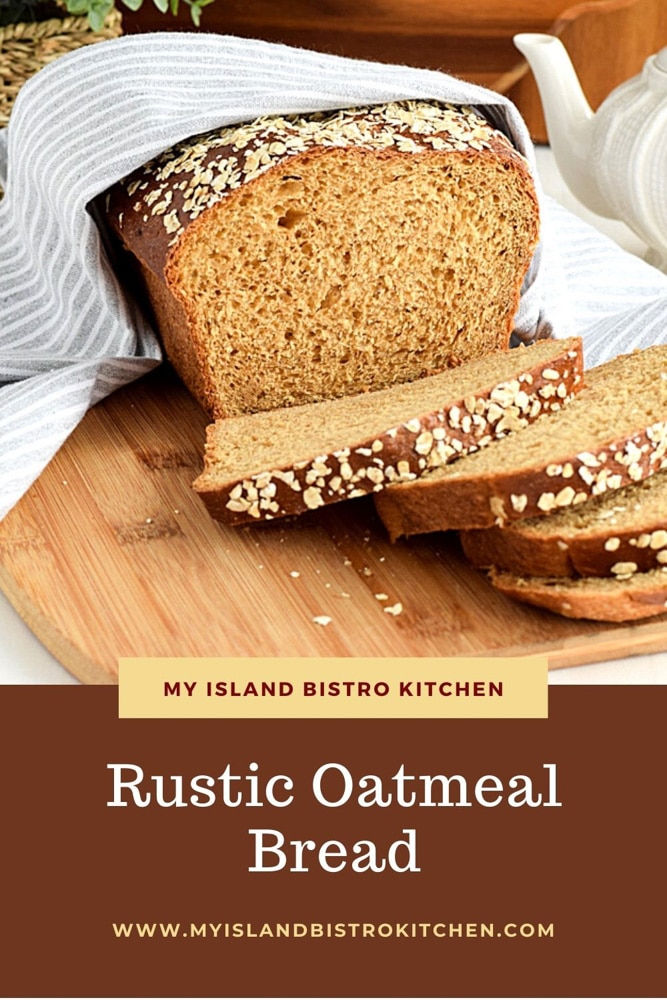
Printable Recipe
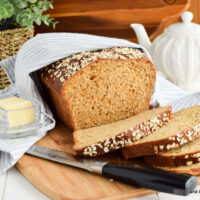
Rustic Oatmeal Bread
Ingredients
- 1 cup quick cooking rolled oats (not instant oats)
- 3 tablespoons butter, room temperature
- 1/3 cup molasses
- 3 tbsp brown sugar, packed
- 2/3 cup scalded milk (no less than 2%M.F.)
- 1 1/3 cups boiling water
- 1 large egg yolk, room temperature, lightly broken up with fork (reserve egg white for loaf topping, if desired)
- 1½ cups whole wheat bread flour
- 4 cups white bread flour (*see note below)
- 2 tsp salt
- ½ cup warm water (110°F)
- 1 tsp granulated sugar
- 1 tbsp + 1 tsp traditional active dry yeast
Rolled Oat Topping: (optional)
- 1 egg white + 1 tbsp water
- Apx. ¼ cup quick cooking rolled oats
- Cooking oil
Instructions
-
Assemble and measure out all ingredients.
-
Place rolled oats, butter, molasses, and brown sugar in medium-sized heat-proof bowl.
-
In separate bowl, combine the 1½ cups whole wheat bread flour with 3 of the cups of the white bread flour along with the salt. Whisk together well and set aside.
-
In small-sized saucepan, over medium-high heat, bring milk to the scalding point (180°F), stirring frequently to prevent milk from scorching. Do not boil the milk.
-
Boil 1 1/3 cups water. Pour the scalded milk and boiling water over the rolled oats mixture. Stir and let stand until mixture has cooled to lukewarm then whisk in the lightly broken up egg yolk.
-
While the rolled oat mixture is cooling, place ½ cup warm water (110°F) in two-cup measuring cup or bowl. Stir 1 tsp sugar into the warm water until sugar is dissolved. Sprinkle yeast over the water and quickly, but gently, stir in the yeast. Let yeast stand, undisturbed with no stirring, for about 10-12 minutes, or until yeast is foamy and bubbly. Stir down yeast and stir into lukewarm rolled oat mixture.
-
In bowl of stand mixer fitted with dough hook, combine the rolled oat and yeast mixture along with 2 cups of the whole wheat, white flour, and salt mixture gradually added, one cup at a time. Beat on slow speed to blend ingredients then increase speed to medium (e.g., the “6” setting on KitchenAid Classic mixer) and beat for 1 minute. Scrape the bowl to ensure all ingredients are incorporated. Again, with mixer on slow speed, gradually add 1 more cup of the flour mixture. Increase speed to medium and beat mixture for 1 minute. Scrape down sides of bowl and repeat procedure for adding the remaining 1½ cups of the whole wheat/white flour mixture, beating for 1 minute to blend in dry ingredients. Mixture will be very sticky at this point.
-
Transfer mixture to a floured surface, using some of the remaining cup of white bread flour to flour the work surface. With hands greased with a small amount of vegetable oil, begin kneading the dough by hand, continuing to add more of the flour called for in the recipe until the dough is smooth, elastic, and pliable, about 7-10 minutes. Periodically re-grease hands with the oil as necessary to prevent them from sticking to the dough. (Note: If you have a very large mixer, the dough could be completely kneaded by mixer; however, if you have a standard-sized stand mixer, it will be difficult to get the dough perfectly kneaded by mixer with the quantity of flour called for in this recipe).
-
Grease a bowl large enough to allow the dough to double in size. Grease all sides of dough with vegetable oil to prevent it from drying out and transfer dough to prepared bowl. Cover the top of the bowl loosely with plastic wrap that has been sprayed with cooking oil. Cover bowl completely with a towel or lightweight blanket and place in warm, draft-free location to rise until dough doubles in size, about 1¼ - 1¾ hours.
-
Prepare two 9”x5”x3” loaf pans by greasing pans (including rims) well.
-
Using vegetable oil, grease the work surface. Deflate the dough by making a fist and punching down the dough in the bowl. Turn flattened dough out onto greased surface. Divide dough into two equal portions.
-
Shape each portion of dough into an oval loaf shape and place in prepared pans.
-
Cover loaves loosely with a tea towel and place in warm, draft-free location to rise again for about an hour or until doubled in size.
-
About 20 minutes before bread is expected to be ready to be baked, preheat oven to 350°F.
-
If rolled oat topping of loaves is desired, beat egg white and 1 tablespoon water with fork or small whisk in small bowl. With a silicone pastry brush and a light touch, brush egg wash over tops of each loaf and sprinkle 1½ - 2 tablespoons of rolled oats over each loaf.
-
Transfer loaves to oven and bake for approximately 45-50 minutes, or until bread is nicely browned on top and loaves sound hollow when tapped. Immediately transfer bread from pans to wire racks to cool. As an alternative to the rolled oat topping, leave loaf tops plain then gently brush tops of the hot bread with butter as soon as the loaves come out of the oven. Cool bread completely before cutting and serving.
Recipe Notes
Yield: 2 loaves
Note: Bread flour is recommended for this recipe; however, all-purpose flour may be substituted (cup-for-cup) for the white bread flour content. Results may differ with substituted all-purpose flour product.
Copyright My Island Bistro Kitchen 2021
You may also enjoy these Bread recipes from the recipe files of My Island Bistro Kitchen:
Homemade White Bread
Old-fashioned Raisin Bread
Whole Wheat Bread
